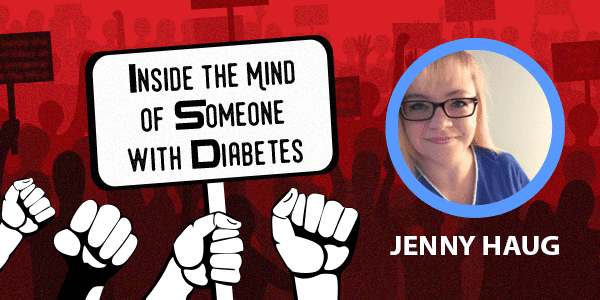Today I'm speaking with Jenny Haug, who has been battling type 1 diabetes for many years. But through it all she has remained positive and carries with her a zest for life. She hasn't let her diabetes hold her back from achieving anything, and I've had the honor of interviewing her to help bring awareness to this chronic illness that many people live with.
First off, what type of diabetes do you have? We have readers with all types, so it's important to talk about this first.
I have Type 1 Diabetes.
How were you made aware that you had diabetes? Please share your diagnosis story with our readers.
I was 17 years old & had a boil on my left side. My doctor said, among other things, that it could be caused by high blood sugars - but that if it was there'd usually be 4 or 5 of them... He had my blood tested "just to be sure" and he found I was type 1. It was found much earlier than usual & so I've never been hospitalized due to my type 1 (knock wood).
We're all curious, even if we live the life, everyone is different, what is a typical day like for you?
Little sleep. About 10 finger sticks a day. Eating & carb counting. Working (I'm like a nurse's aide & I work in home care). I wear a pump - but not a CGM (I didn't like it). Tired all the time.
Describe the one scariest moment since your diagnosis.
There's no specific thing for me per se, but since going on the pump the high highs scare me for fear of going into DKA. And night time lows.
Living with a chronic illness can be overwhelming, how do you cope with the constant battle of trying to maintain a proper balance with your blood sugars?
Sometimes it really gets me down. I cry. It's constant frustration on a daily basis. Some days are better than others.
If you could give one tip to someone newly diagnosed what would it be?
Take a deep breath. There's a huge learning curve, so take your time & keep learning... I've been T1 for over 21 years & I still learn new things. Don't try to be "perfect" - there's no such thing as a perfect diabetic - if you are taking your insulin, counting carbs & checking your BG often, you are doing everything you can! I could eat & do the same thing every day for a week & get different BGs every day - it's your body not you! Ask for help. Find support. You did not cause your T1!
What is the most challenging aspect to you, in living with diabetes?
The public's misconceptions about diabetes. Diabetes is a joke to a lot of people & it hurts. The public not understanding the differences between Type 1 & Type 2 and how they are very VERY different diseases!
And just the constant roller coaster of BGs and trying to correct.
What was your reaction when you found out you had diabetes
(had just gotten home from high school) I was home alone when the doctor's office had called. I cried & begged not to have to take needles.
What was hardest for you and your family — emotionally? Or financially?
I don't remember financially as my dad had decent benefits when I was diagnosed but years later being a divorced single mom it was a real challenged (no benefits & not a good income). But now my husband has great benefits so I'm able to be on the pump (with a government program & his benefits).
Emotionally, I felt very very alone.
How often do you have to test your glucose levels?
I test my blood sugar about 10 times a day.
What insulins have you used or do you currently use?
Humalog and I was on Lantus as well, when I was MDI.
What would you like people who have diabetes to know?
You are not alone! If you are testing, carb counting & taking your meds you are taking great care of yourself!
Who do you get support from? Who treats you?
I have great doctors & endo, a great diabetes education team (my nurse is a type1 too so she "gets" it!)
My family is an amazing support system for me.
And the group on Facebook "You know you're a Type 1 Diabetic when..." has been a great support system
Let's conclude on a positive note. I know it can be difficult to find the light at the end of the tunnel, but if you thought really hard, what is one positive thing that diabetes has brought to your life?
You tend not to take your life for granted. You become much more empathetic to others with invisible diseases.
TheDiabetesCouncil Article | Reviewed by Dr. Sergii Vasyliuk MD on June 02, 2020


